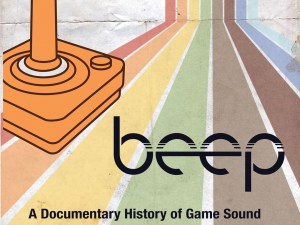What is particularly significant about Beep: A Documentary History of Game Sound can be found at the end of its title – Sound. Beep is a documentary not on just game music, though that certainly would merit a documentary on its own – but on sound in games as a whole, from the rudimentary tones of Pong to modern game sound effects, along with music and voice acting.
The documentary, as mentioned above, starts with the earliest uses of sound in video games, moving on through the 8 and 16-bit eras when game music started to become more melodic, while also having to compete with auditory bandwidth with game’s sound effects, ultimately leading to the introduction of sound samples, MIDI, and modern high quality game audio. Of that journey, most of the story tends to be focused on 8 and 16-bit eras, along with the introduction of MIDI and the various PC sound cards, with the Sound Blaster becoming standard.
It’s a story that’s generally told well, but I can also see bits and pieces of the story that feel like they’re missing or under-addressed, which is something of a bummer, because one of the things that the documentary does do a great job of doing is pointing out for how long game designers have considered the auditory landscape of their games to be almost literally an afterthought. We get some information on particular processors and how they manage sound channels, along with some discussion of how game’s sound designers would have to incorporate sound effects into their compositions, as game sound effects would generally displace one of the instrument channels on the sound chip. All of which is great.
However, for example, when we get to a discussion of PC sound cards and MIDI adapters, we get some discussion of the Sound Blaster Sound Card, how it became ubiquitous due to its low cost, but also its lack of quality – with composers having to work with the limitations of what poor quality sound would come out of the card. Except – as someone who pays attention to retro gaming and computing YouTubers who put a lot of discussion into game audio, I know that there were a lot more MIDI options out there, and a lot of sound designers who not only put in the extra effort to support those MIDI controllers, but for some instances would design with a specific MIDI controller in mind (with Duke Nukem 3D being something of an example), and there’s not much discussion of that, outside of mention of the MIDI support for PCs from Roland and other companies in passing.
There is also sadly limited discussion of the history of voice acting in games – I’d like to have learned more about some of those early digitized voice samples, and how those were realized, along with the early days when the voice actors who worked on the game were often some of the same designers who made it – if not the sound designers themselves. Not to mention, once systems started supporting sound effect samples, how some of those early ones were realized (especially considering the limitations of the sound processors of those consoles – since I suspect in some cases the actual sounds of, for example, a baseball bat hitting a ball might not sound as good on processors of the time).
That said, this is a very solid documentary, and I’m really glad I added this to my library.
Beep is currently not available digitally – so you can pick up a physical copy from Amazon (Affiliate Link).


